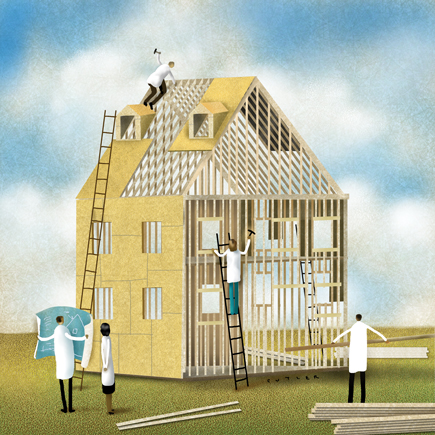November/December 2011

Building the medical home starts in school
Four medical schools revamped their residency programs to include concepts of the patient-centered medical home. The changes resulted in teamwork, continuity of care, and more intense clinical rotations.
HIV comes of age as disease of mid-to-late life
Protease inhibitors revolutionized HIV management, morphing it from a death sentence to a chronic, manageable condition. Medical issues have since grown more complex as doctors consider how HIV interacts with aging, and how aging interacts with these sometimes toxic drugs used to control the virus.
It's tough to navigate return from cancer care to primary care
An Institute of Medicine report suggests that patients are becoming lost in transitions between oncology and primary care. Educating physicians is a key to overcoming many of the barriers.
Evaluating what is important about performance measures
Connecting with the patient and improving their health should be the key factor behind implementing performance measures in the health care system.
What should physicians contribute to deficit reduction?
ACP has proposed that Congress create a national, physician-led initiative to promote high-value care, promote research into comparative effectiveness, and reduce the needless expense of defensive medicine.
ICD-9 diagnosis codes updated for 2011-2012
The latest annual update of the ICD-9 diagnosis codes outlines many new codes that will be common to internal medicine. A comprehensive list outlines what's new.
Options to secure e-mails
Numerous options are available to make e-mail communications to patients more secure.
MKSAP Quiz: Progressive, worsening fatigue
A 59-year-old man is evaluated for a 4-day history of progressive worsening of fatigue, forgetfulness, constipation, excessive thirst and increased urination. He has no pain. Based upon the findings of a physical exam and lab results, what is the most likely diagnosis?.
Nominees named for College Officer and Regent positions
Nominations for ACP President and Board of Regents.
Chapter awardees named
Chapters honor Members, Fellows, and Masters of ACP who have demonstrated by their example and conduct an abiding commitment to excellence in medical care, education, research, or service to their community, their chapter, and ACP.
Teaching the patient-centered medical home
A growing number of residency programs are training new physicians in the PCMH model, with the hopes of improving patient outcomes and attracting more interest in primary care as a career path.
Warnings on Celexa, Zofran; new use of Botox for incontinence
Recalls, warnings, and approvals.
